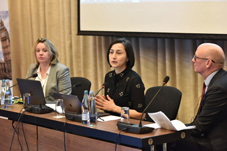
Parliament’s report on dangers of misinformation
By Natalia Kochiashvili
Wednesday, February 5
Presentation of the Report of the Subject Group on Misinformation and Propaganda Issues of the Committee on Foreign Relations of the Parliament of Georgia was held at the Radisson Blu Iveria Hotel this Monday.
The Parliamentary Committee on Foreign Relations launched the Working Group on thematic Disinformation and Propaganda on February 11, 2019, almost a year ago. The process involved both the non-governmental sector and state structures. Group report and recommendations were supposed to be submitted to the Committee for the end of May, however, the process only finalized on February 3, 2020. The head of the working group Nino Goguadze explained that the final report was delayed as the work turned out to be greater than expected.
Importantly, when the group began working, Goguadze and Dimitri Tskitishvili represented the majority, and it was not yet known that the ruling party was using fake Facebook accounts for spreading misinformation.
The group aimed at examining the main challenges and problems that come with spreading disinformation and propaganda in the country and providing appropriate recommendations to the state structures.
According to the findings of the report, the Georgian government took a long time to recognize misinformation and propaganda as a problem, which slowed down efforts and made target audiences of information operations more vulnerable.
In addition, efforts by government agencies to deal with propaganda happen to be largely reactive and rarely involve precautionary steps.
The report also emphasizes that unlike the situation 10 years ago, anti-Western television appeared in the media space. One of the examples is a television company Obiektivi, which has access to a wide range of public groups.
While discussing the report, it was repeatedly stated that it is necessary to set up an inquiry commission in the parliament to investigate the government's connection with the accounts removed from Georgia and answer questions in the public. In the document itself, 344 accounts deleted by Facebook only say that this precedent points to Georgia's interest in Facebook. The report's authors say that in the pre-election period it is important to communicate with the Facebook administration for the transparency of political advertising.
“When Facebook tells you that you are misleading the public, just saying that you are not doing it, is not convincing for the public. If it is in the government's interest to answer the questions, I would recommend setting up an inquiry commission or an inquiry group in a parliamentary format,” said Goguadze.
Goguadze noted that she looks forward to the government's implementation of the report's recommendations, based on the experience of other countries. She added that the conclusion would not change if she stayed in the majority or moved to the opposition.
Recommendations include protecting the 2020 Parliamentary Elections from external interference and local manipulation; identifying Russia's hybrid war and hostile information operations as a threat in the revised National Security Concept. The working group also recommends creating a national narrative about the values of the country, the vision of the future, the union of Georgia with other European civilizations. Developing critical thinking in the younger generations, involving Public Broadcaster in education reform, in particular in the component of increasing critical thinking and media literacy among young people, as well as involving the Georgian Church and Army in Strengthening Euro-Atlantic Integration.
The report was prepared with the support of the Westminster Foundation for Democracy and the United Nations Development Program (USAID) Good Governance Initiative (GGI).
According to the Parliament's Rules of Procedure, the Bureau of Parliament is authorized to include the report of the Subject Group on the agenda of the plenary sitting. Based on the conclusion, the relevant committee or parliament shall develop recommendations or exercise other powers provided for in the regulations. The recommendations and assignments made by the Committee, Parliament are sent to the appropriate administrative bodies.


